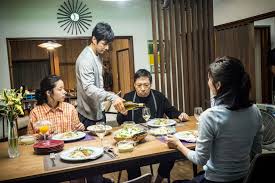Eye For Film >> Movies >> Creepy (2016) Film Review

Just one year after Journey To The Shore, Kiyoshi Kurosawa is back with another book adaptation that features the relationship between a married couple at its core. This one has more in common with his early work, at least in terms of its trappings, but to assume it's just another routine serial killer yarn is to miss the emotional subtlety and sharp analysis of contemporary Japanese mores that underlie the greater horror.
We open with a serial killer in custody and Hidetoshi Nishijima's coolly stylish detective, Takakura, anxious to interview him. When things go awry, Takakura is forced to confront the gulf between his theories and reality, between his learning and his ability to act in the world. It's an experience that leads him to retire. When we next see hm, a year later, he's teaching criminal psychology in a university in a new town, talking about the different categories of serial killers, acknowledging that one of those types is "completely unknowable".

Despite his experience, Takakura remains at last superficially confident, and he's plainly a little bored by the gentle pace of his new job. So when former colleague Nagami (Masahiro Higashide) comes calling to ask for his help in exploring a cold case in a neighbouring town, he agrees - informally at least. A family disappeared there and the sole survivor, just a high school kid at the time, has repeatedly changed her story. Does she have memory problems precipitated by trauma? That's common enough in Kurosawa's films but perhaps it's a red herring here. The two men pursue her relentlessly in an attempt to find out, the scrupulously polite detective revealing another side to himself in the process.
Whilst all this is going on, Takakura's wife, Yasuko (Yûko Takeuchi) is left with not much to do. Her attempts to make friends among the neighbours have largely been rebutted. The suburb where their new house stands is superficially attractive, with narrow lanes and lots of greenery, but look closer and you'll see holes in fences, abandoned appliances rusting away in shared corners, evidence of a death of consideration for anything outside family unit. One neighbour, Nishino (Teruyuki Kagawa) is particularly rude, but in his case Yasuko ascribes it to a lack of social skills, and she persists in trying to get through to him until the two form an awkward bond. Then Nishino's teenage daughter gives Takakura a startling piece of information and things begin to look very creepy indeed.
There are elements to the social disintegration in this film that are distinctly Japanese, yet they find counterparts elsewhere - the way good manners can inhibit essential communication, the way family honour can bind people together in the worst of circumstances, and the way that superstition can shape the interpretation of events. In places the story strays into Gothic territory, with both Takakura and Yasuko experiencing intense, inexplicable reactions to places which have vital import. The film's villain, described by a third party as a monster ('demon' would be a better translation) who only looks like a human being, is definitely not what he appears, and there is perhaps an invitation here to compare Takakura's psychology with more ancient understandings of psychopathy - perhaps equally useful in some circumstances.
Ultimately, Creepy doesn't try to hide where it's going - it is structured around its characters' willingness to perceive things as inevitable and it aims to lure the audience into the same trap. An open ending forces us to face possibility, confronting us with what's frightening about ordinary life.
Approaching this, the film sees complexities emerge in Takakura's previously perfect-looking marriage as Yasuko undergoes an emotional shift that is delivered with profound skill and suddenly reveals how much nuanced work Takeuchi has put into earlier scenes. As Nishijima also gets the chance to expand his emotional arc, our attention is drawn to the blankness of the 'monster' - to that "completely unknowable" quality that might be simple nothingness. As various characters find themselves manipulated through their emotions - with a little chemical help - their weakness highlights their humanity, makes them interesting to the viewer, offers s realness. It is the nothingness of the other, rather than the brief scenes of violence and gore, that opens up the horror at the heart of this deceptively sophisticated film.
Reviewed on: 06 Nov 2016
















